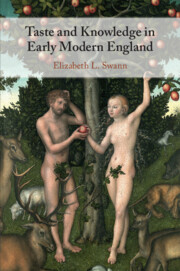Book contents
- Taste and Knowledge in Early Modern England
- Taste and Knowledge in Early Modern England
- Copyright page
- Dedication
- Contents
- Figures
- Acknowledgements
- Note on the Text
- Introduction
- Chapter 1 ‘To dream to eat Books’
- Chapter 2 Anatomizing Taste
- Chapter 3 From Eve’s Apple to the Bread of Life
- Chapter 4 ‘Those Fruits of Natural knowledge’
- Chapter 5 ‘Honey secrets’
- Afterword
- Bibliography
- Index
Chapter 1 - ‘To dream to eat Books’
Of Bibliophagy, Bees, and Literary Taste
Published online by Cambridge University Press: 08 October 2020
- Taste and Knowledge in Early Modern England
- Taste and Knowledge in Early Modern England
- Copyright page
- Dedication
- Contents
- Figures
- Acknowledgements
- Note on the Text
- Introduction
- Chapter 1 ‘To dream to eat Books’
- Chapter 2 Anatomizing Taste
- Chapter 3 From Eve’s Apple to the Bread of Life
- Chapter 4 ‘Those Fruits of Natural knowledge’
- Chapter 5 ‘Honey secrets’
- Afterword
- Bibliography
- Index
Summary
This chapter brings print and manuscript commonplace books into dialogue with anti-theatrical diatribes and defences of poetry in order to establish that literary taste, usually dated to the eighteenth century, emerges much earlier in the humanist trope of the reader as bee, using the sense of taste to discriminate between rhetorical ‘flowers’. Through a reading of Anne Southwell's commonplace book, I claim that in the context of humoral psychology, this trope possessed a literal dimension: contemporary sensitivity to the flavour of gall ink corresponds to the suggestion that literary judgement is exercised through actual acts of tasting. Focusing on Ben Jonson’s paratexts, I submit that this has implications for how we understand the politics of taste: locating judgement at the bottom of the sensory hierarchy, ‘taste’ democratises critical authority.
Keywords
- Type
- Chapter
- Information
- Taste and Knowledge in Early Modern England , pp. 37 - 70Publisher: Cambridge University PressPrint publication year: 2020

